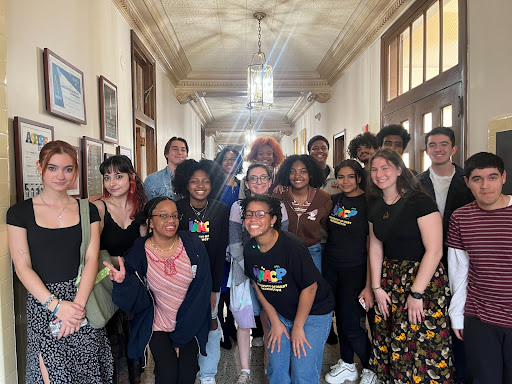NAACP speaks to UFC to advocate for increased diversity amongst faculty
3 min read
Members of the UMW chapter of the NAACP spoke in front of the University Faculty Council Wednesday to advocate for more Black professors. | Ky Huynh, The Weekly Ringer
by KY HUYNH
Staff Writer
On Wednesday, March 22, members of UMW’s chapter of the NAACP advocated for more Black professors at the University Faculty Council meeting. The presentation follows a 2020 report conducted by the UMW NAACP examining the community’s feelings on various topics relating to diversity.
“In 2020 we launched a report about policing on campus, specifically after the policing violence that happened across the country, but specifically in Fredericksburg,” said Maya Jenkins, a senior political science major and president of the UMW chapter of the NAACP. “Along with that, we had a survey that helped to survey not just students but our community members, about how they felt about the police and certain things about the faculty.”
Results of the survey concluded that students felt UMW needed more Black professors on campus.
“We understand the University Faculty Council cannot singlehandedly increase the amount of Black professors on campus,” Jenkins said. “We understand that that’s not what the governing body’s position is, but we did want to explain some of our concerns when it comes to being Black students in the classroom and what we do gain from having Black professors.”
Owen Chong, a junior computer science major, and Kaylah Lightfoot, a sophomore political science major, were the two main speakers representing the NAACP.
“Black professors in the past have made me feel more welcomed and motivated in the classroom,” said Chong. He mentioned how many students like himself have learned the most from professors who looked like them. “In general, Black professors diversified our education, brought new topics to the table and challenged current perceptions about race and STEM,” he said.
In his time at UMW, Chong has nearly completed all requirements for the computer science major, but he has never had a computer science class taught by a Black professor.
Bringing in more professors of color, he said, “will offer new perspectives and integrate content about bias and equality.”
Through lived experiences, Lightfoot said, Black professors bring more than just a curriculum into the classroom.
“They’re using the facts that all Black people typically go through when it comes to teaching on certain concepts,” she said.
Lightfoot spoke about feeling disconnected from white professors.
“As a Black student, it was harder for me to connect to other white professors when I got here because it was a lack of understanding and a lack of blending with one another,” she said.
Shavonne Shorter, chief diversity officer, praised the efforts made by the UMW NAACP.
“To be honest, UFC are meetings I don’t typically attend, but I was so proud of NAACP and their presentation,” she said. UMW NAACP has previously consulted with Shorter on various issues. “I’m grateful they consulted my opinions in the past about all of this, and I just want to continue supporting the things they’re doing,” she said.
Chong expressed the importance of fighting systemic racism, specifically in STEM.
“We ask that UMW equip us with the tools that we desperately need to combat systemic racism in STEM fields by either naturally bringing in more Black professors or other professors of color to offer new perspectives and courses or by integrating content about bias and inequities in STEM into current classes,” he said. “If we are equipped with this knowledge, we will have a better and longer impact in our communities, especially in the world of STEM. We will be the educated students of today, the educated leaders of tomorrow and the educated mentors for the next generation.”
Lightfoot believes that by diversifying academics on campus, UMW can better adhere to its ASPIRE values.
“Black professors are the pivotal thing that make UMW, UMW,” she said.


